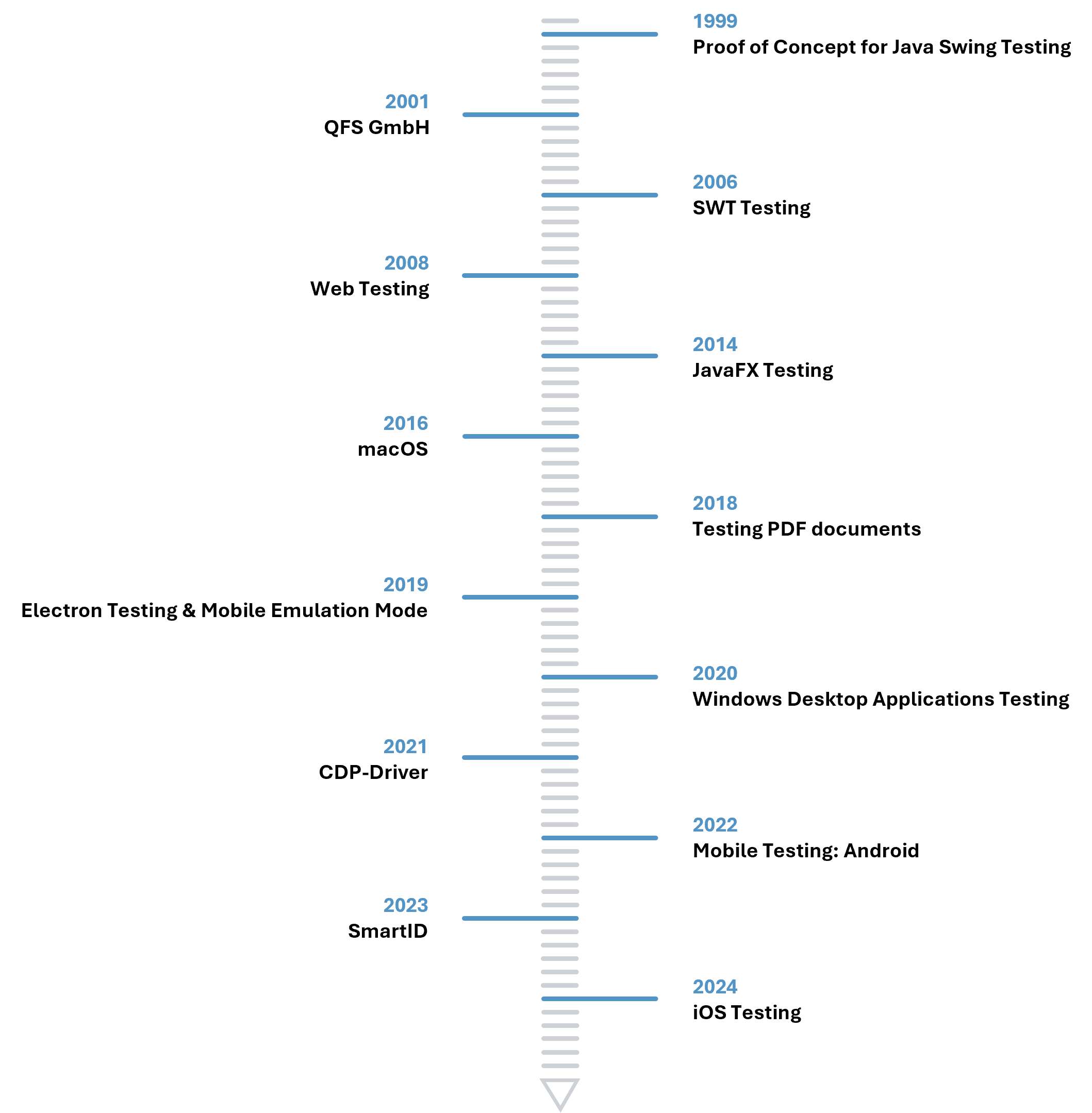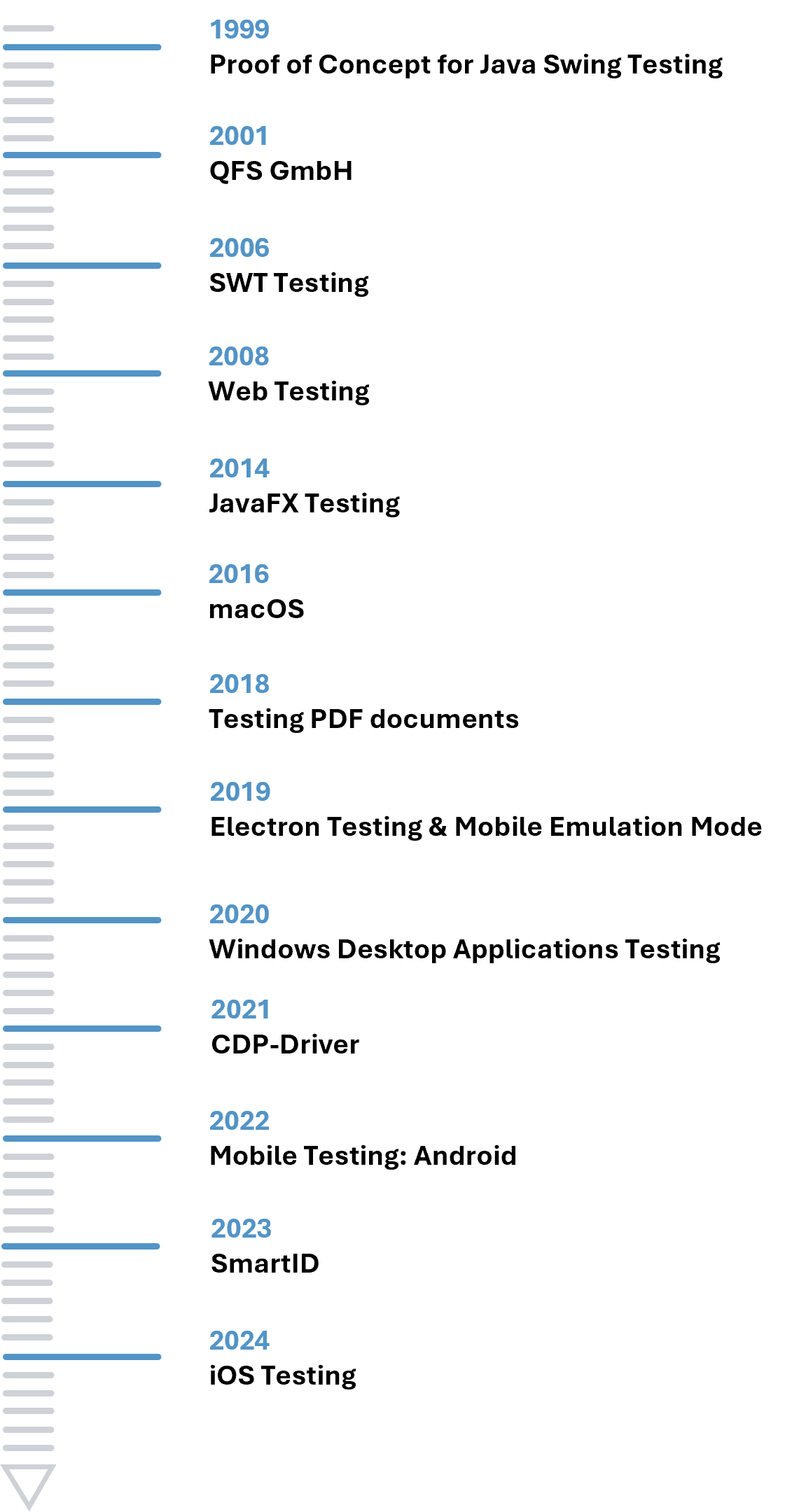
2024-08-08
With QF-Test 8 you can now also test native iOS applications under macOS on real devices or in the simulator. To celebrate this new UI engine, Android and iOS are unlocked until October 1, 2024, so you can directly run automated tests against your mobile apps with QF-Test 8 and your current license...
The new "Solarized" UI Theme with its harmoniously attuned color scheme is available in light and dark mode.
JPro support has been updated to improve integrated tests of JavaFX applications running in a browser and the new QF-Test Assertions API, inspired by Chai.js, brings expressions in a naturally readable style to QF-Test scripts.

2024-02-08
In our latest medium upgrade QF-Test 7.1 the display of tree nodes in test-suites and protocols has been revised, so that they appear – depending on your personal configuration – slimmer and fresher...
Additionally, QF-Test now has a special high contrast theme which makes the work more comfortable for some eyes and thus improves the accessibility of QF-Test.
With QF-Test 7.1 you can now use the QF-Test UI inspector to analyze the structure of Windows, Swing and embedded web applications.
For testing web applications QF-Test comes with a variety of preconfigured CustomWebResolvers. These have been extended with version 7.1 to directly support applications developed with Vaadin (versions 14, 23 & 24+) or the Flutter web framework, or which are generally compatible with the WCAG ARIA standard.
2024-02-27
The only change to this version is the removal of three executable files from the embedded cdp4j library that were suddenly flagged as malicious by various scanners. Those files were part of QF-Test since version 6.0.4 (November 2022), have never been used by QF-Test and should be harmless.
2024-03-14
This maintenance release adds support for Eclipse / SWT 4.31 alias "2024-03" and fixes a number of smaller bugs.
2024-04-24
This maintenance release adds support for Java 23 and fixes a number of smaller bugs. Moreover, the visual inspector for analyzing UI components is now also available for JavaFX applications.

2023-04-27
QF-Test 7.0 is our latest and greatest version of QF-Test.
Historically, big updates to QF-Test brought support for new GUI technologies. This time, however, the focus is on the experience of using QF-Test itself...
Most noticeable in QF-Test 7.0 is the streamlined UI. On top of that, there is the long-requested, beautiful new dark mode.
The paradigm shift towards SmartID is now accomplished, thanks to a complete overhaul of the algorithm for determining the best label for a component.
Testing web applications is greatly improved thanks to an intuitive new way of configuring CustomWebResolvers, complemented by a brand-new visual UI inspector.
2023-05-31
This maintenance release adds support for ARM Java on macOS as well as Eclipse / SWT 4.28 alias "2023-06" and fixes a number of bugs.
2023-06-23
This maintenance release fixes a number of bugs, most notably one concerning restoring the latest session.
2023-07-13
This maintenance release fixes a few bugs, most notably special cases concerning recognition of legacy qfs:label extra features and empty screenshots.
2023-08-30
This maintenance release updates the JRE distributed with QF-Test to Temurin version 17.0.8.1_1, adds support for Eclipse / SWT 4.29 alias "2023-09" as well as JxBrowser 7.34 and fixes a number of smaller bugs.
2023-09-20
Besides a few bug fixes, including a critical update for support of headless Chrome 117 and higher on Linux, this maintenance release adds support for JxBrowser 7.35 and updates the standard library qfs.qft for Acrobat Reader version 23 and up.
2023-09-29
This maintenance release fixes a serious security issue in the WebP library embedded in QF-Test for image compression in run logs and test suites. The library has been updated to version 1.3.2.

2022-05-17
The main headline is support for testing Android applications. The familiar features and concepts of QF-Test can be applied to creating tests for Android applications on virtual and real devices with ease and efficiency...
At least as relevant is the new concept of SmartIDs, which are an alternative way of addressing components. SmartIDs encapsulate relevant information directly in the component ID so that component nodes become optional. The idea is to keep simple things simple and use the full range of information in component nodes only for the tricky cases. This paradigm shift is still under development and deserves its own major release, but in response to the enthusiastic customer feedback on the existing functionality and stability we are making it available now in the form of a - fully supported - preview feature.
The SmartID concept has also paved the way for integration of QF-Test with Robot Framework, letting fans of Robot Framework implement their keywords via QF-Test procedures. The tool integration carried out with a pilot customer will be presented at the RoboCon conference (May 19-20, 2022).
Among the many other improvements, the following stand out: You can now run QF-Test itself with Java 17 for vastly improved display on scaled monitors, QF-Test reports have been revised with a more modern look, screenshots for the run-log are taken of relevant screens only and duration indicators assist in analyzing the time spent during tests. Major version updates like the switch to Groovy 4 or support for testing Java 19 become mere side-notes in the detailed release notes.
2022-06-09
This maintenance update adds support for Eclipse / SWT 4.24 alias "2022-06" and fixes a number of smaller bugs.
2022-07-20
Besides the usual bug fixes, this update improves clean shutdown of running batch tests and adds the ability to clear global variables in calldaemon mode.
2022-09-06
This maintenance release updates the JRE distributed with QF-Test to version 8_345, adds support for Eclipse / SWT 4.25 alias "2022-09" as well as JxBrowser 7.27 and fixes a number of smaller bugs.
2022-11-29
This maintenance release comes with many version updates, among them JRE version 8_352, Eclipse / SWT 4.26 alias "2022-12" as well as JxBrowser 7.28. Besides a few bug fixes it also introduces some smaller new features, including an option for prefixing classes when recording SmartIDs or the new rc methods pushOption and popOption.

2021-12-15
The medium upgrade QF-Test 5.4 adds support for testing applications based on Java 18, the embedded Chrome browser for QF-Driver has been updated to CEF version 95 and Eclipse/SWT 4.22 alias "2021-12" is now supported...
Electron applications can now be addressed via the far superior CDP-Driver connection mode, the options dialog has a search functionality and copy/paste of images is now possible for image check nodes and screenshot logs.
Several more new features and version updates are complemented by various bug fixes, some of which have a slight impact on backwards compatibility
2022-01-20
This maintenance release includes a few minor version updates and fixes a handful of bugs.

2021-05-20
With the newly added browser connection mode CDP-Driver (Chrome DevTools Protocol) this medium upgrade is a real game-changer for web test automation with QF-Test...
By talking directly to the browser it supports Google Chrome, Microsoft Edge and Opera on Windows, Linux and macOS with a performance, stability and feature set formerly only available with QF-Driver for Chrome on Windows. And that's on top of a massive performance boost of QF-Driver for Chrome with observed speed-up ranging from 10% to over 500%.
The user interface of QF-Test has been cleaned up and streamlined, using a uniform flat look with fewer lines and beautiful new icons that still maintain the existing image language and are immediately recognizable. The HTML manual and tutorial as well as report and test documentation have also received a face-lift.
The update of the Jython integration to fully support international characters is complemented by several more new features and a handful of bug fixes.
2021-06-15
This maintenance update adds support for Java 17, Eclipse / SWT 4.20 alias "2021-06", Opera 77 as well as JxBrowser 7.16 and fixes a number of smaller bugs.
2021-07-21
This maintenance update works around a limitation of CDP regarding text retrieval and fixes a number of smaller bugs.
14.09.2021
Diese Wartungsversion bringt Unterstützung für Eclipse / SWT Version 4.21 bzw. "2021-09", Opera 78 und 79 sowie JxBrowser bis Version 7.19 und beseitigt einige kleinere Bugs.

2020-11-10
The medium upgrade QF-Test 5.2 focuses on integrated testing of Java desktop applications that are displayed in a browser using the technologies Webswing or JPro...
Most notable among many version updates are updated support for Chrome 85 in QF-Driver mode on Windows as well as Groovy (3.0.6) and Jython (2.7.2) updates. The life of Mac users is made easier by the Apple notarization of QF-Test for macOS.
2020-12-03
This maintenance update adds support for Eclipse / SWT 4.18 alias "2020-12" and for JxBrowser 7.12. It further rounds off Webswing support and fixes a number of bugs, including an issue with Jython on Linux.

2020-07-08
The medium upgrade QF-Test 5.1 focuses on bringing support for embedded browsers - JxBrowser (including version 7), SWT Browser and JavaFX WebView, up to par with that for "normal" browsers...
It also comes with support for Java 15, native Electron dialogs and customizable HTML reports. The internal JRE provided with QF-Test has been updated to Zulu OpenJDK 8_252.

2020-02-24
It's time to move on: QF-Test 5.0 is a major step forward - not just with its new look and support for native Windows applications, but also with other enhancements that make automated testing more convenient and reliable...
Support for testing the accessibility of web applications
Object variables: Store images, lists and other objects in QF-Test variables and access them conveniently across your scripts
1. Functional cookies
We use functional cookies to ensure the basic functionality of the website.
2. Performance and statistic cookies
We use Matomo for analyzing and optimizing our website. Cookies permit an anonymous collection of information that help us offering you a clear and user-friendly visit of our web pages.
This cookie contains a unique, pseudonymized visitor ID internal to Matomo for recognizing returning visitors.
This cookie is used to track from which website the anonymized user proceeded to our website.
The Matomo session cookie is used to track the visitor's page requests during the session.
is created and should be then directly deleted (used to check whether the visitor’s browser supports cookies).
short lived cookies used to temporarily store data for the visit.
short lived cookies used to temporarily store data for the visit.


